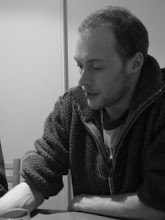
In this superb book, Scarlett Thomas throws together the concepts of modern scientific thinking and physiological reasoning regarding consciousness into a thoroughly gripping yarn. To describe it simply as a novel is doing Thomas a great disservice. In truth it is really a very clever thought experiment in the classical sense of Schrodinger or Maxwell, all nicely encased in a fast-paced, entertaining adventure story. Although there are a number of reviews out there(e.g., bookslut or Katrina), here's my two penneth.
The story follows disillusioned Ph.D student Ariel Manto. Her supervisor vanished some 12 months prior to the begging of the tale, and as we begin her University is falling down. Through a series of strange events she ends up finding a very rare copy of the book 'The End of Mr Y' by Thomas Lumas, a supposedly cursed text of which there are only a couple of copies known to exist. Contained within this valuable work is the recipe to make a drug which allows one to access the Troposphere, a extra set of dimensions where all consciousnesses interact. Obviously, being the plucky young heroine in a modern adventure novel, she goes straight out to get the necessary ingredients and have a go herself. Needless to say, all hell breaks loose and and we're led on a merry old romp.
Although the basic skeleton of the story isn't something insanely creative and new, the concepts Thomas discusses along the way are what make it. Some pretty complex and very thought provoking issues are introduced, all in a manner that leaves the reader interested and wanting to know more. Somehow, Thomas manages to strike the perfect balance between being complex and engaging, without also being confusing.
The basic idea revolves around the principle that thought (i.e., consciousness) is matter, thereby enabling consciousness to take the form of a higher dimensional space. This Troposphere therefore allows you to gain access to other peoples mind and their memories. In principle, the statement that thought = matter is true, thoughts can be observed as increased electrical activity within the brain. For me, how this ties with an extra 'consciousness' dimension is probably a step too far. But, one idea Thomas discusses along the way, is the belief that consciousness evolves in a similar way to physical traits.
This I find immensely emotive. As is pointed out, under this principle there is nothing to stop machines developing consciousness, indeed it could be thought of as being unavoidable. So, HAL or Skynet mightn't be that far off!
In conclusion, The End of Mr Y is a great book, and doesn't feel anywhere near the 506 pages in length it is. If you have an interest in the philosophical sciences then you'll find it extremely engaging, and well worth curling up with one sunny spring afternoon.



No comments:
Post a Comment